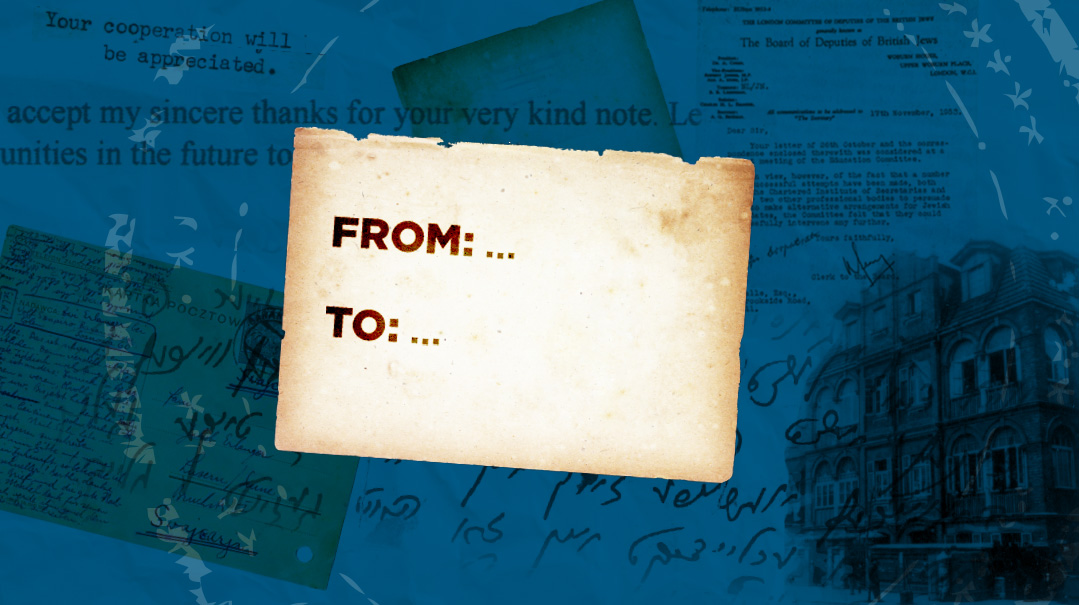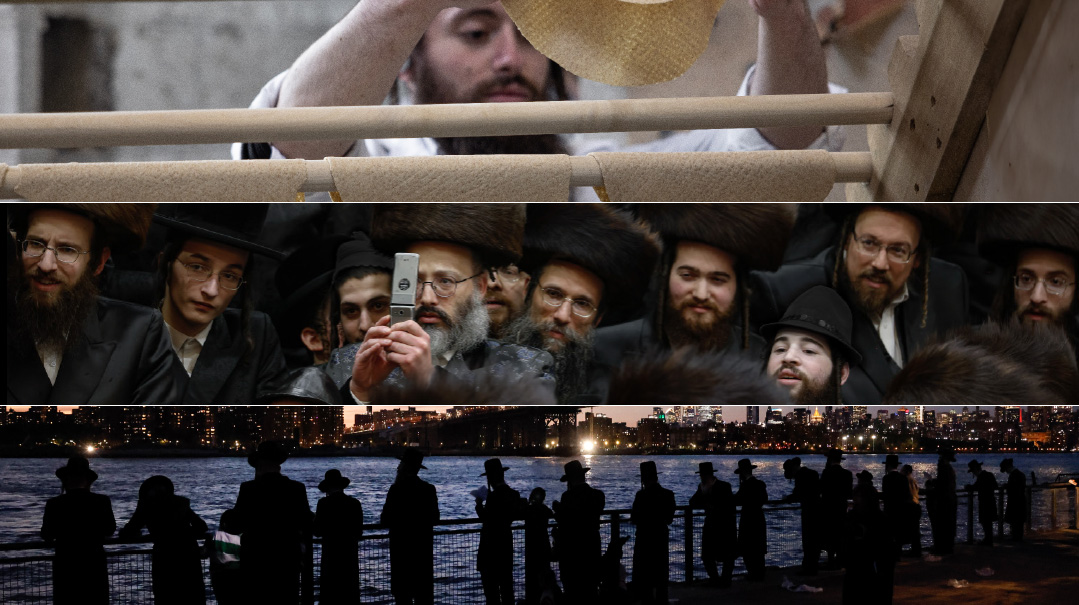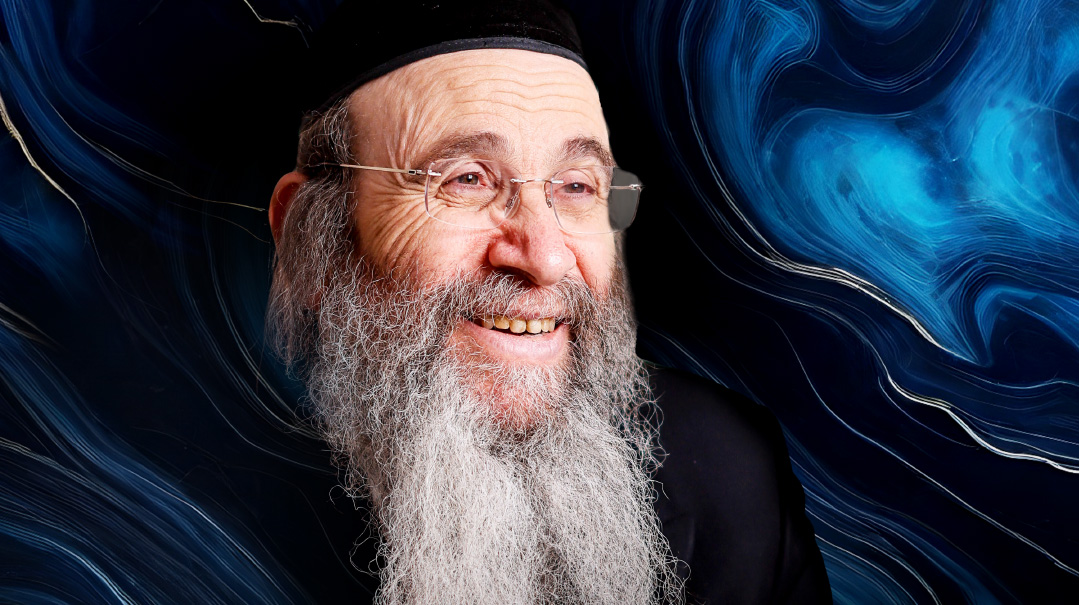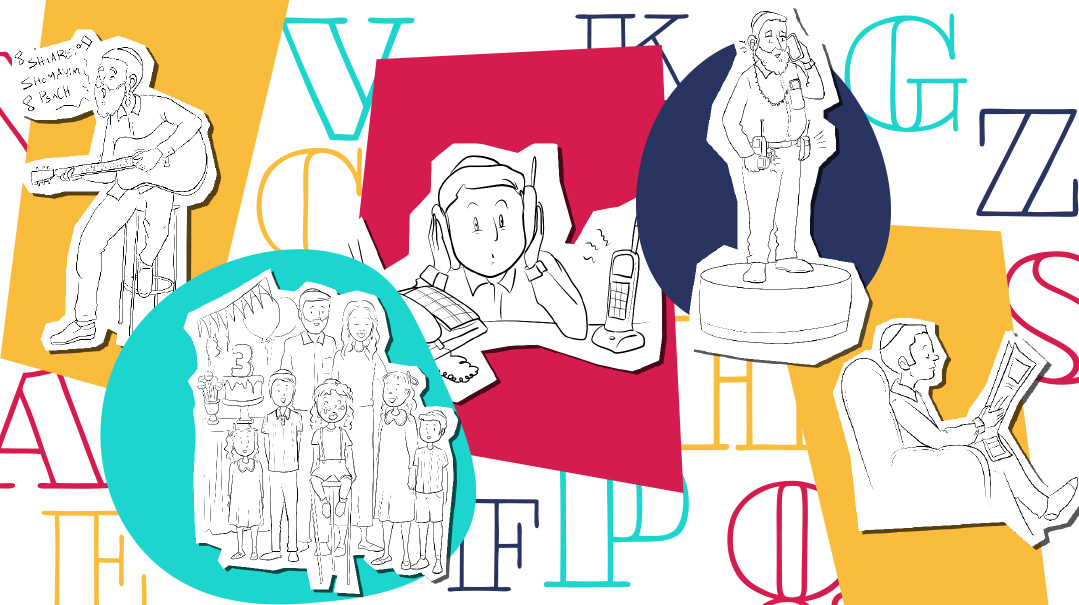Where Country and Soul Music Merge

As Country Yossi paints a picture of the development of his persona, he also provides a moving glimpse of the sensitive soul that created some of the frum world’s most beloved country music

Despite his frequent appearances in print, radio, and music albums, there’s a lot that people don’t know about Country Yossi. In a candid conversation, the popular entertainer divulges how a kid from East New York became known as “Country Yossi,” shares his memories of Rav Shlomo Freifeld, describes his original unintended foray into children’s entertainment, and reveals the secret behind the skyrocketing popularity of his radio show (“give away free prizes!”). But as he paints a picture of the development of his persona, he also provides a moving glimpse of the sensitive soul that created some of the frum world’s most beloved country music
There’s a very special man, in a very special place, there is wisdom in his eyes and a smile upon his face. In yeshivah he’s the Rebbi, he’s your Rebbi and your Rebbi is your friend … Someday, when you’re older and much wiser, you’ll realize how much you don’t know. You’ll look and cry up to Shamayim, oh Rebbi, I miss you so …
These were the words that determined that I simply had to meet Country Yossi, or Yossi Toiv. Deeply immersed in the research for my book on the life and impact of Rav Shlomo Freifeld, ztz” l, the lyrics to this song, which was written by Yossi Toiv in honor of Reb Shlomo, made me realize that beneath the exterior of Country Yossi’s legendary humor and hilarity lies a deep, sensitive soul.
Today, the name Country Yossi is associated with his popular radio show and monthly magazine, both of which are comedic in nature. The man himself, however, is far from a comedian. To be sure, the laughs come easy and the quips are plenty, but there is a certain quiet pensiveness about him as well.
The Boy From East New York
Yossi Toiv grew up, as did so many others in that time, in East New York. His grandfather was a distinguished Lubavitcher chassid, and as such, he attended the Lubavitcher yeshivah. He credits the principal there, Rabbi Schrage, with developing his creativity. “I wrote up a few pages of what I thought could be sort of a school paper and showed them to him. He was delighted, and mimeographed several copies for me to sell. Shoin, I was in the magazine business!”
He grew up in a home filled with song. His father, Reb Chaim Toiv, is a chazzan of great renown and a former talmid of Mesivta Rabbeinu Chaim Berlin. Reb Chaim sent his son to the yeshivah — which was then in Far Rockaway — as well. Yossi recalls sitting and chatting with a group of his friends one Friday afternoon, waiting for Minchah to begin, when he got his first glimpse of Reb Shlomo Freifeld. “He walked into the beis medrash, this immense man with peyos dripping wet, a flowing beard, and the widest hat I had ever seen. We had heard rumors about a new menahel, and we gulped at the thought that this might be him. He was huge. But then he smiled and introduced himself and said, ‘Come boys, let’s learn some Mishnayos together.’
For the next twenty minutes, they sat riveted while he taught, and by the time he rose, they were sold. “At the end of the year, Reb Shlomo informed me that he was starting his own yeshivah — Sh’or Yoshuv — and invited me to join. I was thrilled.”
Reb Shlomo had grown up in East New York, just like many of the boys, and he would remind them of that. “He would smile and place his arm on my shoulders, and say ‘I’m just like you!’
Musical Pioneer
Country Yossi was an early pioneer in the Jewish music scene. That, too, has its roots in Sh’or Yoshuv. “I was roommates with Shmelkie Brazil — today Rav Shmuel Brazil, a rosh yeshivah at Sh’or Yoshuv — and he had a guitar,” Yossi remembers. “He would come running into the room sometimes, totally aflame, and start playing. He’d had an inspiring thought or uplifting emotion that he had to commit to music. I remember when he composed his classics: “Bilvavi” and “Shmelkie’s Niggun.”
“Anyhow, when I expressed interest in learning how to play, he drew me up a chord sheet and I would just play around with his guitar. In time, I grew pretty proficient at it.”
When did you start writing songs? I ask.
“Well, I always enjoyed writing parodies; I would take the popular country and pop tunes and lyrics of the day and rewrite them with a different, Jewish twist or message. I also had some original, serious songs, like “Who Knows One” and “Little Kinderlach.” I would play those songs to the kids at various NCSY kumzitz’s around the USA, and they became very popular.
“At the time, there were very few professional Jewish music groups, and the Rabbi’s Sons were immensely popular, so Shmelkie and I decided to do it our way and put out a record. We formed a group and called it the Or Chodosh. Our parents lent us the money to get started, and within months, we had a best-selling album. At the time, the way to ‘make it’ in Jewish music was by being featured on the old Art Raymond Show on WEVD radio, and once he started to play our music, we had concert requests from all over.”
So what happened to the group that gave us some perennial hits, like “Shmelkie’s Niggun,” “Bilvavi,” “Oh the World” (written by Country Yossi) and “Eileh Vorechev?” “Reb Shlomo called in Shmelkie and told him that he didn’t want him to perform on stage. In hindsight, I guess Rebbi discerned that Shmelkie was rosh yeshivah material and didn’t want him distracted with nareshkeit,” Yossi surmises. “Of course, Shmelkie listened and never performed. Rebbi didn’t tell that to the rest of us (no compliment there), so Yussie Lieber, Nachum Deutsch, and myself proceeded to give concerts across the country.”
Yossi and the Or Chodosh group produced a few more albums featuring Yossi’s songs. The compositions of Reb Shmuel, who ultimately became a Rebbi in the yeshivah, were released in the first “Regesh” album several years later. “For a bochur, the concerts and albums were pocket money; I was able to buy a car and repay my parents for their original loan,” Yossi recounts.
Once we’re on the subject of his car, Yossi remembers a great story with me. “Since I was one of the few bochurim in yeshivah who had a car, the Rebbi would often give me the privilege of driving him to Bielegeisen’s seforim store — which he loved to visit weekly. So once I was driving him up the Rockaway Turnpike in my ancient Chevy, and I got pulled over by a policeman. I was shocked; the beat-up car couldn’t possibly have exceeded the speed limit.
“I rolled down the window and the cop indicated the trail of white smoke that was following my car. ‘You’re getting a ticket because your vehicle is smoking,’ he informed me gravely.
“I looked right at him and said, ‘Officer, this car is old enough to smoke.’
“Reb Shlomo was laughing all the way to Brooklyn.
“Many years later, I was living in Flatbush and didn’t have too much of a connection with Reb Shlomo, but I heard that his Rebbetzin had passed away, so I went to be menachem avel. I entered the crowded house, and there sat my Rebbi, next to Rav Aharon Schechter and other illustrious personalities. When he saw me, he leaned over close to Reb Aharon and asked, ‘Do you know what this bochur once said to a cop?’
The Formula That Worked
Country Yossi’s original band may no longer be a household name, but most of New York’s frum residents are intimately familiar with his name and face, emblazoned across a monthly advertising magazine that they all bring home. The magazine, whose costs are covered by the many advertisements that comprise the bulk of its pages, also offers a friendly take on the latest trends and phenomena in the community, with lively debate in the language of the people. The farthest possible thing from an intellectual journal, it is a light and fun advertising medium that has been accepted by the community for the entertainment it offers.
How did the magazine start? Yossi remembers his original formula: “We were looking for a way to entertain people, but still offer some substance. I actually brought the first issue to Reb Shlomo and he gave me a warm brachah. We were specifically not trying to cater to intellectuals, but rather just to offer the masses something readable, yet different.”
Country Yossi shares a philosophy. “People are so beaten down by real life that they simply need an escape, they need to smile, to laugh. We always saw that as our mandate.”
It seems to have worked. As fast as they could print magazines, people would snap them up, and the publication is now in its twenty-first year. “You know, Rabbi Eli Teitelbaum, ztz” l, was a strong and steady supporter of the magazine, and would frequently write articles for us when he had an opinion he wanted to voice, which was often.
“He would say, ‘Perhaps there are more prestigious publications, but I have this ‘thing’; I like my articles to be read!’
Taking advantage of my access to the publisher, I ask several questions. Are the very amusing letters to the editor real? “Absolutely,” he insists.
I ask how a magazine that is distributed widely, from Boro Park to Staten Island to Williamsburg to Crown Heights, can ever hope to satisfy the hashkafic sensibilities of its readership. He is candid about it. “There were some issues that we had to deal with over the years, such as featuring sheitel advertisements with women’s faces. As our tzibbur has grown increasingly sensitive, we have worked hard not to offend anyone.”
Now for the question that’s been bothering people for years: he’s just a kid from East New York; how did he become “Country Yossi”? He laughs. “Well, one of my earlier ventures was a series of best-selling CDs, DVDs, books, and a board game. Some of the songs on the albums are classic country songs that are given a Jewish lyrical twist, so that’s how I got the name ‘Country Yossi.’
Yossi adds something: “Oh, and I go to the country every summer, too.”
As other country-goers will know, prime entertainment on Thursday nights in the Catskills is Country Yossi’s radio show, where listeners are treated to a trademark potpourri of music, conversation, and halachah quizzes, complete with prizes. So many calls come in at once that the phone company had to intervene and request that Country Yossi limit his callers by borough. The volume was simply too high.
Why would someone call the show? Country Yossi smiles his trademark smile and drawls, “Freeeeee. People love free stuff, and we give away lots of it.”
He tries to inject the show with meaning, and has developed a program where the trivia questions are all about hilchos Shabbos. The proficiency of the callers can result in better prizes. “Just like in the magazine, we always try to be entertaining, but we are looking to give something more, to add some depth and value.”
In the Kids’ Department
The younger generation might be more familiar with Country Yossi as the harried host tending to two loveable creatures who manage to inject their banter with Torah lessons. The funny thing is that Country Yossi never planned to produce albums for kids. His children’s albums, known as the “Shteeble-Hoppers” and the “Kivi and Tuki” series, developed through “pure siyata d’Shmaya,” as Country Yossi puts it. Oh — and they also have their roots in the country.
“Once, when I was up in the Catskills, I met an old friend, Heshy Walfish, whom I knew from the time when he had been in the Messenger’s Orchestra and I had been in the Or Chodosh,” Yossi recalls. “We had both become more or less ordinary citizens; he was running a computer leasing company and I was doing my ‘advertising thing,’ and we got to reminiscing about the old times.
‘Are you still writing songs?’ he asked. I told him that I had written a couple of English parodies, taking popular songs and rewording them with a more Jewish message, but that I had never really played these songs for anyone. Heshy, who is super-talented, loves music, loves arranging, and his eyes lit up. ‘Let me hear them,’ he said.
“We got together, and he took my stuff into his studio. He emerged with some beautiful arrangements and we co-produced Country Yossi and the Shteeble-Hoppers. The success of that first album astonished us, but it emboldened us to keep going as well. We now have fourteen and counting.”
Were there copyright issues involved in using popular songs? I wonder.
“Well, initially I tried to contact the composers, but I had no luck. We were small potatoes; obviously, the big names in country music weren’t returning the phone calls of some frum guy in Brooklyn. But I subsequently learned that there is no copyright infringement in using a parody of a popular tune and reworking it for religious purposes.”
The original Shteeble-Hoppers albums spawned a more kid-friendly version, “The Adventures of Kivi and Tuki.” Between the two series, hundreds of thousands of albums have been sold.
Internalizing the Message
Magazine publisher, band leader, children’s entertainer, radio host … is this where you saw yourself going? I ask Country Yossi. He laughs and replies, “I have a master’s degree in psychology from Long Island University, so professionally, this is not where I was headed, but, baruch Hashem. It’s been an enjoyable ride so far — halevai veiter!”
I cannot let our conversation end without one more story about Reb Shlomo, and I ask Country Yossi to accommodate me. He grows contemplative again and tells me that he will share one about the Rebbetzin.
“There was a song that I wrote when I was in Sh’or Yoshuv; it was on the Or Chodosh album, called ‘I Am a Sheep.’ The lyrics were moving and thoughtful.”
I am a sheep
And I follow my master
Through mountains of stone
And meadows of grass
I eat when he feeds me
And sleep when he lets me
For I am a sheep
And I follow my master
I am a slave
And I work for my master
In broiling, hot summer
And numbing, cold winter
I run to his summons
And run from his presence
For I am a slave
And I work for my master
I am a child
And I honor my father
In moments of pain
And hours of shame
I tremble and fear him
But love him and heed him
For I am a child
And I honor my father
I am so blind
And am led by a fire
Through black nights and days
On paths made of paper
I go where it guides me
It follows beside me
For I am so blind
And am led by a fire
I am a sheep, I am a slave,
I am a child, I am so blind
I am a pebble flung in the ocean
Brimming with wonder, filled with devotion
Weak as the lamb, strong as the leopard
For I am a sheep …
And the L-rd is my Shepherd
“I was once in Rebbi’s home, and the Rebbetzin, a”h, a remarkable woman in her own right, called me over. ‘Yossi,’ she said, ‘I must have the lyrics to I Am a Sheep written up for me so I can study them.’ I sat down and wrote all the words down on a paper for her.
“The next time I was in the house, she again called me over. ‘Yossi, I lost the paper; can I trouble you to rewrite the words for me?’ So for a second time I committed the lyrics to paper and left them with her.
“The next time that I was in the house, she again asked me for a copy of the words so that she could teach it to her students, and the following time she asked me to write them for a friend.
“I couldn’t understand at the time why she couldn’t just copy them herself, but as I grew older, I understood very well. She wanted me to write them. She knew that while I had written the lyrics, I hadn’t yet become one with the message, and that I could benefit from the reminder that ‘I am a sheep and the L-rd is my shepherd.’ She hoped that by continuously writing them, they would have an effect on me as well.”
The story is a magnificent one, and it nicely synopsizes that chinuch method of this giant couple, the Freifelds. Like all Country Yossi’s tunes, the refrain of I Am a Sheep will be on constant replay in my head for the rest of the day, but it only serves to drive home the underlying message.
There is much depth to this man and his music, an awareness that beneath the jokes and one-liners, we are all sheep and the L-rd is our Master.
(Originally featured in Mishpacha, Issue 304)
Oops! We could not locate your form.












